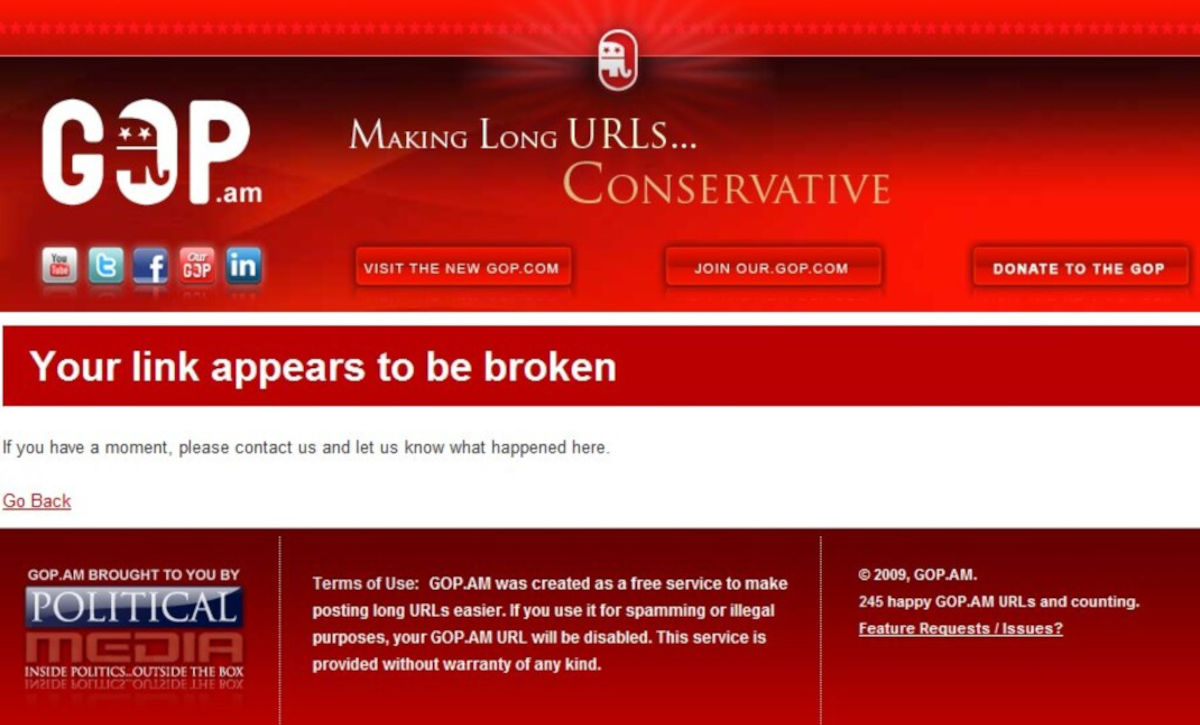In 2009, the Republican Party launched GOP.am, a branded URL shortener designed to modernize its digital communication. But within hours, the tool was hijacked by pranksters, turning political links into punchlines. This case study reveals how a simple short link became a viral embarrassment, and what it teaches us about the risks of unmoderated URL shorteners, link hijacking, and digital reputation in political campaigns.
- A Digital Initiative Without Safeguards
- The GOP’s Counterattack
- A Case Study in Cybersecurity and Digital Governance

A Digital Initiative Without Safeguards
In December 2009, the U.S. Republican Party (often referred to as its nickname Grand Old Party, shortened to GOP) launched GOP.am, a URL shortening service designed to help amplify its digital messaging on social media, particularly Twitter. Developed by the conservative agency Political Media Inc., the tool was intended to modernize the GOP’s digital presence. But it was launched without basic security measures: no user authentication, no content filtering, and no link validation. In short, anyone could create a GOP.am link pointing to any destination online.
Unlike traditional shorteners like Bit.ly or TinyURL, GOP.am did more than just shorten links, it wrapped the destination page in a GOP-branded frame, including links to Our.GOP.com and a donation page for the Republican Party. This partisan overlay made the service’s hijacking even more absurd, users could generate GOP.am links pointing to left-leaning sites like The Huffington Post, now framed with Republican fundraising banners.
Predictably, online pranksters soon took over the platform, creating links that redirected to adult content, the official website of the American Communist Party, and even a store selling Barack Obama-themed sex toys. A tool designed to strengthen political messaging had instantly become a source of ridicule.
The GOP’s Counterattack
As the abuse quickly spread, especially on Twitter, the GOP’s technical team scrambled to contain the situation. After initially removing links manually, they implemented an automatic redirection mechanism, any flagged or offensive link would now redirect users to official GOP pages, including donation portals and action campaigns. Ironically, this tactic converted trolling traffic into party visibility.
Some pranksters even continued creating GOP.am links after the redirection rules were applied, fully aware that they would now boost GOP exposure instead of mocking it, a form of inverted trolling.
Just one day after launch, the platform began blocking inappropriate links and was even taken offline temporarily. One detail that drew ridicule: a typo in the original Terms of Service that warned users not to post “lude” content instead of the intended lewd. This only added to perceptions that the project had been rushed and poorly executed.
Despite efforts to salvage the platform, GOP.am was quietly shut down after about three weeks. No official statement was issued by the Republican Party or Political Media Inc., leaving the public narrative entirely in the hands of the media and critics.
A Case Study in Cybersecurity and Digital Governance
This incident is a textbook example of the risks involved with unmanaged URL shorteners, especially when tied to a political or institutional brand. Without moderation, link tracking, or abuse detection, these tools can quickly be weaponized.
In this case, while the unintended consequences did drive more traffic to GOP content, the damage to credibility and messaging control was significant. As a fallback, the GOP launched tcot.me (Top Conservatives on Twitter), a more restricted platform limited to approved users. But the alternative shortener never gained traction and faded into obscurity.
At the time of shutdown, GOP.am’s homepage displayed: “681 happy GOP.AM URLs and counting”, a small number that reflects how quickly the project was derailed.
| Identified Problem | Immediate Consequence | Recommended Best Practice |
|---|---|---|
| Open access for all users | Massive abuse and ironic or offensive link hijacking | Restrict access or require user authentication |
| No link moderation | GOP-branded links redirected to inappropriate content | Implement auto-filters or human review |
| No monitoring of redirects | Loss of control over the party’s digital reputation | Log and review redirect activity continuously |
| No crisis communication strategy | Media and opponents controlled the narrative | Prepare a public response plan in advance |
| Delayed technical response | Credibility damaged, service shut down quickly | Anticipate misuse before launch |



